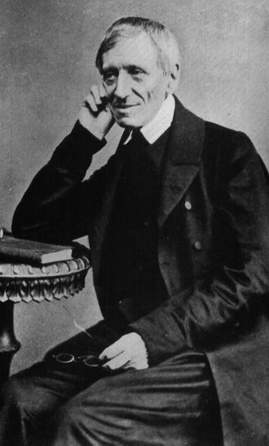Apologia Chapters III and IV.1
Newman's revolution of mind and sickness (almost) unto death
Chapter III--Doubt Enters His Mind
 In Chapter III (1839-1841) of his Apologia Newman backs up from the furor over Tract 90 to discuss the "revolution of his mind" and the pain of recalling those years of growing doubt and psychic disturbance. In his opinion, the 1839 article he wrote for the British Critic was the last writing he published as a convinced and confident Anglican, and in that sense, the article is a clear snapshot of the views of the Oxford Movement at that time. He was proud of the quality of the movement yet concerned with the disorder in it, still holding great hope for a reformed Church of England. At that time, he could clearly define the differences between the Anglican position and the Roman Catholic one as antiquity vs. catholicity (90-91, 93-95):
In Chapter III (1839-1841) of his Apologia Newman backs up from the furor over Tract 90 to discuss the "revolution of his mind" and the pain of recalling those years of growing doubt and psychic disturbance. In his opinion, the 1839 article he wrote for the British Critic was the last writing he published as a convinced and confident Anglican, and in that sense, the article is a clear snapshot of the views of the Oxford Movement at that time. He was proud of the quality of the movement yet concerned with the disorder in it, still holding great hope for a reformed Church of England. At that time, he could clearly define the differences between the Anglican position and the Roman Catholic one as antiquity vs. catholicity (90-91, 93-95):
Summary Stance: Antiquity and Apostolicity--We are connected to the Patristic Church by an apostolic succession of bishops.
Summary Critique: Roman church has left the purity of the Patristic Church
Further Defense: The doctrinal truth of the Church is her foundation.
Further Critique: Rome is mistaken in doctrine and practice, esp. in treatment of Mary and the saints, as well as views of papal authority
Key Charge: Rome possesses the Note of Idolatry
Summary Stance: Catholicity and Apostolicity--There is but one Church connected to the apostolic line, and we are it.
Summary Critique: Anglican church has left the unity of the Catholic Church.
Further Defense: Union with the larger body is a duty (and necessary for salvation).
Further Critique: Canterbury is mistaken in cutting herself off from the Catholic Church where the heritage of Christ resides.
Key Charge: Canterbury possesses the Note of Schism.
- The Arian example pushes Newman to see that his own position is like that of the semi-Arians, while the Protestants are true Arians. The Via Media will not hold.
- The Bishops formal charges against him for three years wear him down and call into question his place in the Anglican Communion.
- The Jerusalem Bishopric affair undercuts his own sense of the Anglican Church as a "branch" of the universal Catholic Church since it violates diocesan rights of churches already in existence there and attempts intercommunion.
Questions
- How does each position know what is true? Where do they put their trust?
- In each position, how do you bring about reform?
- Why do each think the other has committed the greater wrong?
- Why does Newman begin to doubt his position?
- Why would the three blows be so shattering for Newman?
Chapter IV.1--Sickness Unto Death
Chapter IV is the longest of the chapters, and Newman divides it into two portions that examine separate, if overlapping, stages of his move from growing doubt to eventual certainty. Section 1 focuses more on his ineffective attempts to find a new position to replace the Via Media and his state of mind once he leaves parish work to retire to Littleton.
Position I. The Via Media is completely shattered by the Jerusalem Bishopric.
Position II. He tries to argue that while the Anglican Church lacks catholicity, it still has the Note of Spiritual Life. In particular, he holds that the orthodox beliefs of the people influence the state of the church, but the reaction to Tract 90, not only by the bishops, but by the public at large forces him to realize that this position does not hold water either.
Position III. He next considers the state of the Anglican Church to be like Israel once divided from Judah. She does not have the temple, but she is in covenant or at the very least experiencing an extraordinary means of grace from God. However, the bishops descent into heretical positions eventually robs Newman of this hope, too.
Newman still holds onto hope for the COE, even as the second strain in the Oxford Movement leaves him bewildered. He withdraws from parish work and preaching to Littleton, but he finds that he will not be left alone by the press. To further explain his state of mind, he includes seven letters from Littleton (142-144), his answer to Faber's accusation that he is a concealed Romanist, and several letters to Catholics from 1841-1843 (149-153). These last ones include his reflections on private judgment vs. conscience and his view that Liberalism is an anti-Christ.
Questions
- Try to put yourself imaginatively in Newman's place: What would it feel like to go through this period of doubt and confusion?
- How does his shift of focus and changing position mirror his view of how minds work?
- What role do the letters serve in his defense of his motives?
